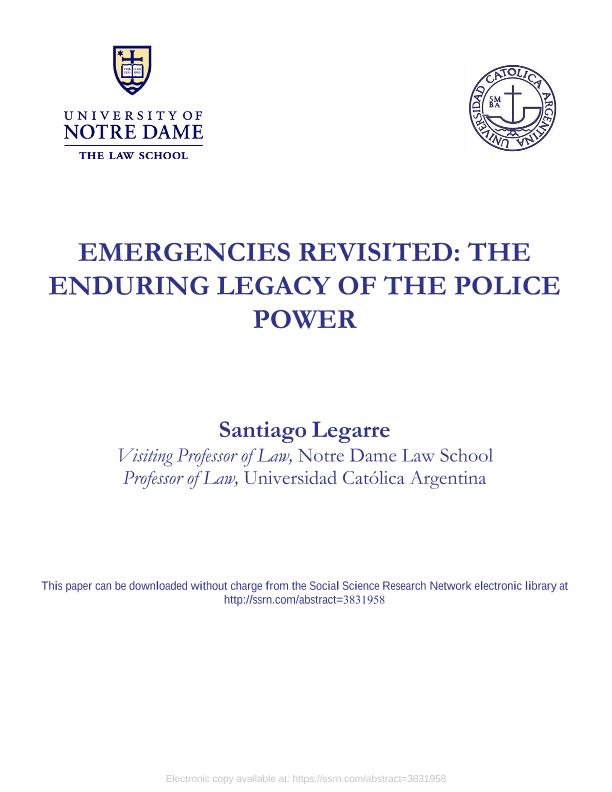Mostrar el registro sencillo del ítem
dc.contributor.author
Legarre, Santiago

dc.date.available
2022-08-12T23:17:52Z
dc.date.issued
2021-04
dc.identifier.citation
Legarre, Santiago; Emergencies Revisited: The Enduring Legacy of the Police Power; Belmont University; Belmont Law Review; 8; 2; 4-2021; 408-426
dc.identifier.issn
2688-0792
dc.identifier.uri
http://hdl.handle.net/11336/165470
dc.description.abstract
It is sometimes thought that the police power belongs with the history of constitutional and administrative law. Section I of my contribution to this Symposium on Contemporary Issues of Administrative Law shows that that impression is partly correct. As I explore the historical background of the police power, I invite the reader to join me in an excursion into the past indeed. Pufendorf, Blackstone, Vattel, and other fairly old-fashioned authors, deal with “police” in ways that prefigure the police power of the states in America.1 Nevertheless, the police power is ever present, under different names, in contemporary jurisprudence; the current coronavirus pandemic is unquestionably providing strong regulatory powers an opportunity to shine again in the legal firmament. Section II starts by underlining how “police” landed in the nascent United States, where it became known as “police power,” courtesy of an ever-creative Supreme Court Chief Justice John Marshall. This section also tracks the evolution of the police power in United States case law, distinguishing a broad from a narrow conception of police power and pointing out how the police power also received other names, such as “power of regulation” or “regulatory power.” Section III of this article explains the ways in which the police power plays a significant role in international law, in particular in what has to do with foreign investment. The distinction between expropriation (including indirect takings) and non-compensable regulatory measures has been clearly accepted in bilateral investment treaties as well as in other sources of international law. Section IV of this Article explores the moral dimension of the police power, with particular focus on the law of overruling necessity, both as a principle concerning the dispensation of rules and as a principle concerning the restriction of rights. Two examples are examined in some detail. The first, coming from Argentina (the author’s country of origin), involves the exceptional dispensation of the principle of separation of powers – a constitutional rule in Argentina, as well as in other countries, including of course the United States. The second, coming from the U.S., involves the restriction of property rights during emergencies, tracking the economic crisis around the great depression of 1930. Section V of this Article emphasizes the importance of having tools that help readers of this Article understand the legal aspects of the present Covid crisis, concluding that the history of the police power and its moral dimensions are of crucial importance with a view to understanding the present.
dc.format
application/pdf
dc.language.iso
eng
dc.publisher
Belmont University
dc.rights
info:eu-repo/semantics/openAccess
dc.rights.uri
https://creativecommons.org/licenses/by-nc-sa/2.5/ar/
dc.subject
Emergency
dc.subject
Law
dc.subject
Police Power
dc.subject
Natural Law
dc.subject.classification
Derecho

dc.subject.classification
Derecho

dc.subject.classification
CIENCIAS SOCIALES

dc.title
Emergencies Revisited: The Enduring Legacy of the Police Power
dc.type
info:eu-repo/semantics/article
dc.type
info:ar-repo/semantics/artículo
dc.type
info:eu-repo/semantics/publishedVersion
dc.date.updated
2022-08-11T13:05:05Z
dc.identifier.eissn
2688-0792
dc.journal.volume
8
dc.journal.number
2
dc.journal.pagination
408-426
dc.journal.pais
Estados Unidos

dc.journal.ciudad
Nashville
dc.description.fil
Fil: Legarre, Santiago. Pontificia Universidad Católica Argentina "Santa María de los Buenos Aires". Facultad de Derecho. Centro de investigaciones Jurídicas "P. J. J. Llambías" y Doctorado; Argentina. Consejo Nacional de Investigaciones Científicas y Técnicas; Argentina
dc.journal.title
Belmont Law Review
dc.relation.alternativeid
info:eu-repo/semantics/altIdentifier/url/https://repository.belmont.edu/lawreview/vol8/iss2/4/
Archivos asociados
